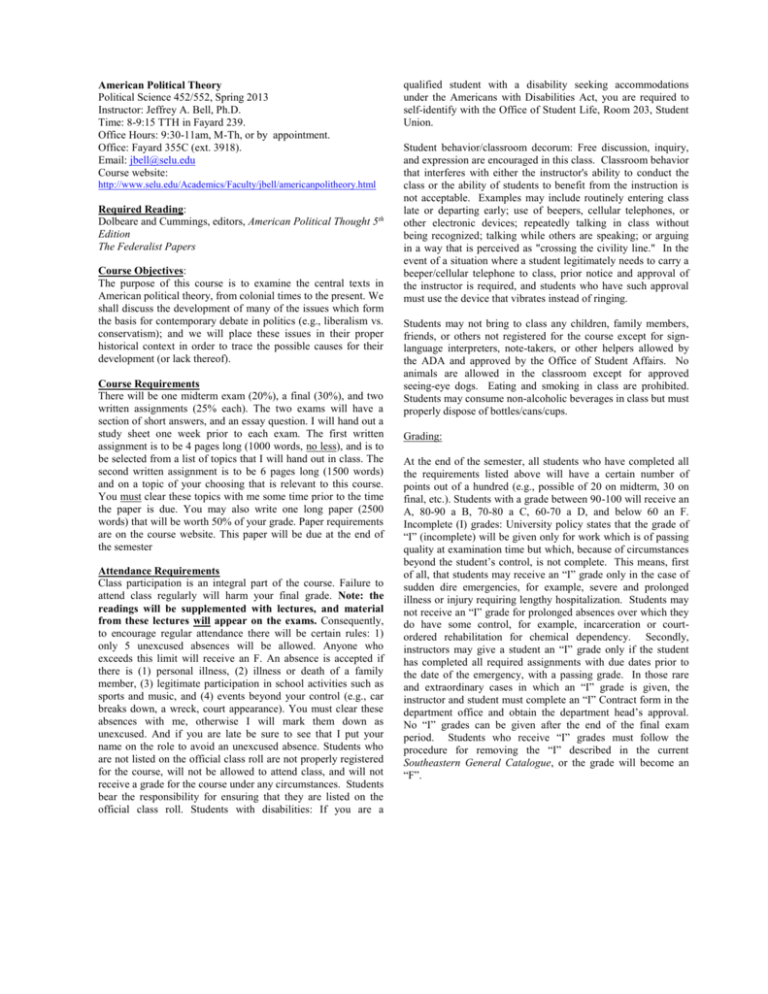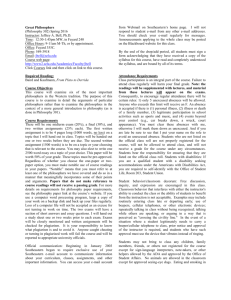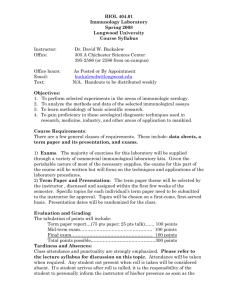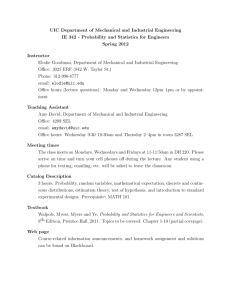American Political Theory - Southeastern Louisiana University
advertisement

American Political Theory Political Science 452/552, Spring 2013 Instructor: Jeffrey A. Bell, Ph.D. Time: 8-9:15 TTH in Fayard 239. Office Hours: 9:30-11am, M-Th, or by appointment. Office: Fayard 355C (ext. 3918). Email: jbell@selu.edu Course website: http://www.selu.edu/Academics/Faculty/jbell/americanpolitheory.html Required Reading: Dolbeare and Cummings, editors, American Political Thought 5th Edition The Federalist Papers Course Objectives: The purpose of this course is to examine the central texts in American political theory, from colonial times to the present. We shall discuss the development of many of the issues which form the basis for contemporary debate in politics (e.g., liberalism vs. conservatism); and we will place these issues in their proper historical context in order to trace the possible causes for their development (or lack thereof). Course Requirements There will be one midterm exam (20%), a final (30%), and two written assignments (25% each). The two exams will have a section of short answers, and an essay question. I will hand out a study sheet one week prior to each exam. The first written assignment is to be 4 pages long (1000 words, no less), and is to be selected from a list of topics that I will hand out in class. The second written assignment is to be 6 pages long (1500 words) and on a topic of your choosing that is relevant to this course. You must clear these topics with me some time prior to the time the paper is due. You may also write one long paper (2500 words) that will be worth 50% of your grade. Paper requirements are on the course website. This paper will be due at the end of the semester Attendance Requirements Class participation is an integral part of the course. Failure to attend class regularly will harm your final grade. Note: the readings will be supplemented with lectures, and material from these lectures will appear on the exams. Consequently, to encourage regular attendance there will be certain rules: 1) only 5 unexcused absences will be allowed. Anyone who exceeds this limit will receive an F. An absence is accepted if there is (1) personal illness, (2) illness or death of a family member, (3) legitimate participation in school activities such as sports and music, and (4) events beyond your control (e.g., car breaks down, a wreck, court appearance). You must clear these absences with me, otherwise I will mark them down as unexcused. And if you are late be sure to see that I put your name on the role to avoid an unexcused absence. Students who are not listed on the official class roll are not properly registered for the course, will not be allowed to attend class, and will not receive a grade for the course under any circumstances. Students bear the responsibility for ensuring that they are listed on the official class roll. Students with disabilities: If you are a qualified student with a disability seeking accommodations under the Americans with Disabilities Act, you are required to self-identify with the Office of Student Life, Room 203, Student Union. Student behavior/classroom decorum: Free discussion, inquiry, and expression are encouraged in this class. Classroom behavior that interferes with either the instructor's ability to conduct the class or the ability of students to benefit from the instruction is not acceptable. Examples may include routinely entering class late or departing early; use of beepers, cellular telephones, or other electronic devices; repeatedly talking in class without being recognized; talking while others are speaking; or arguing in a way that is perceived as "crossing the civility line." In the event of a situation where a student legitimately needs to carry a beeper/cellular telephone to class, prior notice and approval of the instructor is required, and students who have such approval must use the device that vibrates instead of ringing. Students may not bring to class any children, family members, friends, or others not registered for the course except for signlanguage interpreters, note-takers, or other helpers allowed by the ADA and approved by the Office of Student Affairs. No animals are allowed in the classroom except for approved seeing-eye dogs. Eating and smoking in class are prohibited. Students may consume non-alcoholic beverages in class but must properly dispose of bottles/cans/cups. Grading: At the end of the semester, all students who have completed all the requirements listed above will have a certain number of points out of a hundred (e.g., possible of 20 on midterm, 30 on final, etc.). Students with a grade between 90-100 will receive an A, 80-90 a B, 70-80 a C, 60-70 a D, and below 60 an F. Incomplete (I) grades: University policy states that the grade of “I” (incomplete) will be given only for work which is of passing quality at examination time but which, because of circumstances beyond the student’s control, is not complete. This means, first of all, that students may receive an “I” grade only in the case of sudden dire emergencies, for example, severe and prolonged illness or injury requiring lengthy hospitalization. Students may not receive an “I” grade for prolonged absences over which they do have some control, for example, incarceration or courtordered rehabilitation for chemical dependency. Secondly, instructors may give a student an “I” grade only if the student has completed all required assignments with due dates prior to the date of the emergency, with a passing grade. In those rare and extraordinary cases in which an “I” grade is given, the instructor and student must complete an “I” Contract form in the department office and obtain the department head’s approval. No “I” grades can be given after the end of the final exam period. Students who receive “I” grades must follow the procedure for removing the “I” described in the current Southeastern General Catalogue, or the grade will become an “F”. Posting Grades: Apr 25 Dewey, “Public and its problems” During the semester grades will not be posted for this class. All graded assignments will be returned in class as soon as they are graded. The instructor is required to keep final exams on file for a year following completion of the course. Final course grades will be posted on the Peoplesoft system. Do not call the department office or the instructor’s office to ask about grades— it is illegal to give such information over the phone. Apr 30 FDR, 405-20. May 2 Reagan, 466-76 Reading Assignments Jan 22 Introduction Jan 24 Winthrop, "The Little Speech," pp. 15-17. Wise, “Democracy is Founded in Scripture” Franklin, pp. 24-35. May 16 (Thursday) Final Exam: 12:30-2:30pm. Jan 31 Samuel Adams, “Rights of the Colonists” Paine, "Common Sense, et. al" pp. 39-48. John Adams, “Thoughts on Gov’t” Feb 5 Feb 7 Adams, “Defense of Constitution” Federalist #82. Jan 29 Feb 12 No Class. Mardi Gras. Feb 14 Class Film. Feb 19 Federalist #99 Feb 21 Federalist #10, 37 Feb 26 Federalist #39, 44, 48, 51 Feb 28 “ Paper topics handed out. Mar 5 Mar 7 Federalist #9, 15 Federalist #70, 78, 84 Review for Midterm. Mar 12 Midterm Mar 14 Hamilton’s Program, pp. 127-39. March 15 is last day to drop. Mar 19 Thomas Jefferson: Principles and Program Mar 21 “Marbury vs. Madison” Papers Due. Mar 26 "McCulloch v. The State of Maryland," Mar 28 Thoreau, “Civil Disobedience” 191-200. March 29 – April 5 Spring Break. April 9 John C. Calhoun, “Disquisition on Gov’t” April 11 Lincoln, 233-47 Apr 16 Edward Bellamy, Populism, 287-300 Goldman, 341-53. Apr 18 Debs, 354-69. Progressivism, Taylor, 379-92. Apr 23 Wilson, “Meaning of Democracy” May 7 May 9 John Rawls, tba Robert Nozick, tba Review. Papers Due.








